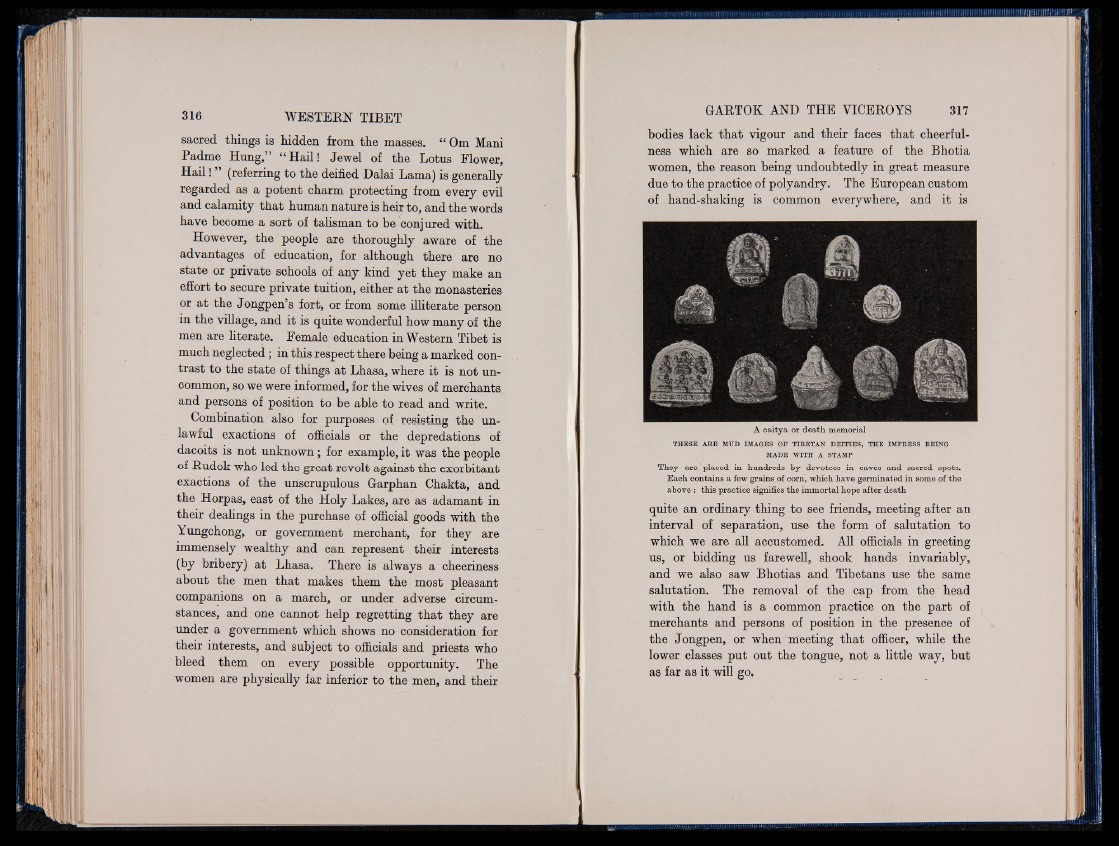
sacred things is hidden from the masses. “ Om Mani
Padme Hung, “ Hail! Jewel of the Lotus Flower,
Hail! ” (referring to the deified Dalai Lama) is generally
regarded as a potent charm protecting from every evil
and calamity that human nature is heir to, and the words
have become a sort of talisman to be conjured with.
However, the people are thoroughly aware of the
advantages of education, for although there are no
state or private schools of any kind yet they make an
effort to secure private tuition, either at the monasteries
or at the Jongpen’s fort, or from some illiterate person
in the village, and it is quite wonderful how many of the
men are literate. Female education in Western Tibet is
much neglected ; in this respect there being a marked contrast
to the state of things at Lhasa, where it is not uncommon,
so we were informed, for the wives of merchants
and persons of position to be able to read and write.
Combination also for purposes of resisting the unlawful
exactions of officials or the depredations of
dacoits is not unknown; for example, it was the people
of Rudok who led the great revolt against the exorbitant
exactions of the unscrupulous Garphan Chakta, and
the Horpas, east of the Holy Lakes, are as adamant in
their dealings in the purchase of official goods with the
Yungchong, or government merchant, for they are
immensely wealthy and can represent their interests
(by bribery) at Lhasa. There is always a cheeriness
about the men that makes them the most pleasant
companions on a march, or under adverse circumstances,
and one cannot help regretting that they are
under a government which shows no consideration for
their interests, and subject to officials and priests who
bleed them on every possible opportunity. The
women are physically far inferior to the men, and their
bodies lack that vigour and their faces that cheerfulness
which are so marked a feature of the Bhotia
women, the reason being undoubtedly in great measure
due to the practice of polyandry. The European custom
of hand-shaking is common everywhere, and it is
A caitya or death memorial
THESE ARE MUD IMAGES OP TIBETAN D E IT IE S , THE IMPRESS BEING
MADE WITH A STAMP
They are placed in hundreds by devotees in caves and sacred spots.
Each contains a few grains of corn, which have germinated in some of the
above : this practice signifies the immortal hope after death
quite an ordinary thing to see friends, meeting after an
interval of separation, use the form of salutation to
which we are all accustomed. All officials in greeting
us, or bidding us farewell, shook hands invariably,
and we also saw Bhotias and Tibetans use the same
salutation. The removal of the cap from the head
with the hand is a common practice on the part of
merchants and persons of position in the presence of
the Jongpen, or when meeting that officer, while the
lower classes put out the tongue, not a little way, but
as far as it will go.